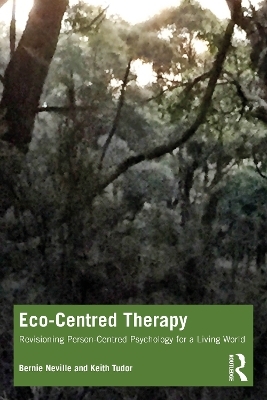
Eco-Centred Therapy
Routledge (Verlag)
978-1-032-50282-3 (ISBN)
Offering a much-needed update of Rogerian theory and practice, and based on insights from cultural studies and ecopsychology, this book breaks new ground by questioning the relevance of certain ways of thinking about counselling and psychotherapy not least in the current planetary emergency.
In response to the growing need for therapists to address increasing anxieties about the climate crisis, Bernie Neville and Keith Tudor address the issue in terms that help therapists reflect on their practice. Based on the authors’ previous publications and incorporating new material, this book presents and explores ideas that have been largely neglected in person-centred literature. It re-visions person-centred psychology (PCP) from what has become predominantly its application to individuals to a broader perspective on and about life and the living world. Further, it takes a philosophical and cultural perspective to re-present and re-vision PCP as a 'we' psychology, an eco-psychology, and an eco-therapy.
This book will be of interest to those working in the fields of person-centred therapy, ecopsychology, and ecotherapy as well as those involved in the education, training, and supervision of counsellors and psychotherapists.
Bernie Neville (1938–2021) was a De La Salle Brother before marrying and having a family, an academic, counsellor, and author with a deep interest and presence in person-centred psychology, Jungian psychology, and process philosophy. He was a Professor in the Faculty of Higher Education, Swinburne University of Technology, and at the Phoenix Institute, both in Melbourne, Australia. Keith Tudor is Professor of Psychotherapy at Auckland University of Technology, Auckland, Aotearoa New Zealand, where he is also co-lead of a Group for Research in the Psychological Therapies. He is an internationally-recognised author; his latest books include (with David Key) Ecotherapy: A Field Guide (Karnac, 2023).
Introduction Part 1: Ground 1. Taking Rogers seriously 2. The mind of things 3. We is: The ground of being 4. Person-centred psychology and therapy, ecopsychology and ecotherapy Part 2: Conditions 5. We cannot imagine without the other: Contact and difference in therapeutic relating 6. Crying for the loss of nature: Incongruence and alienation 7. Being anxiously congruent, and congruently anxious 8. Accepting hopelessness as a hopeful process 9. Five kinds and four modes of empathy 10. Experiencing and perceiving Part 3: Freedom – with Responsibility 1. Setting therapy free 12. Setting therapists free 13. Setting Bernie free: A eulogy
| Erscheinungsdatum | 05.12.2023 |
|---|---|
| Zusatzinfo | 2 Tables, black and white; 13 Halftones, black and white; 13 Illustrations, black and white |
| Verlagsort | London |
| Sprache | englisch |
| Maße | 156 x 234 mm |
| Gewicht | 450 g |
| Themenwelt | Geisteswissenschaften ► Psychologie ► Allgemeine Psychologie |
| Medizin / Pharmazie ► Gesundheitsfachberufe | |
| Medizin / Pharmazie ► Medizinische Fachgebiete ► Psychiatrie / Psychotherapie | |
| ISBN-10 | 1-032-50282-7 / 1032502827 |
| ISBN-13 | 978-1-032-50282-3 / 9781032502823 |
| Zustand | Neuware |
| Informationen gemäß Produktsicherheitsverordnung (GPSR) | |
| Haben Sie eine Frage zum Produkt? |
aus dem Bereich


